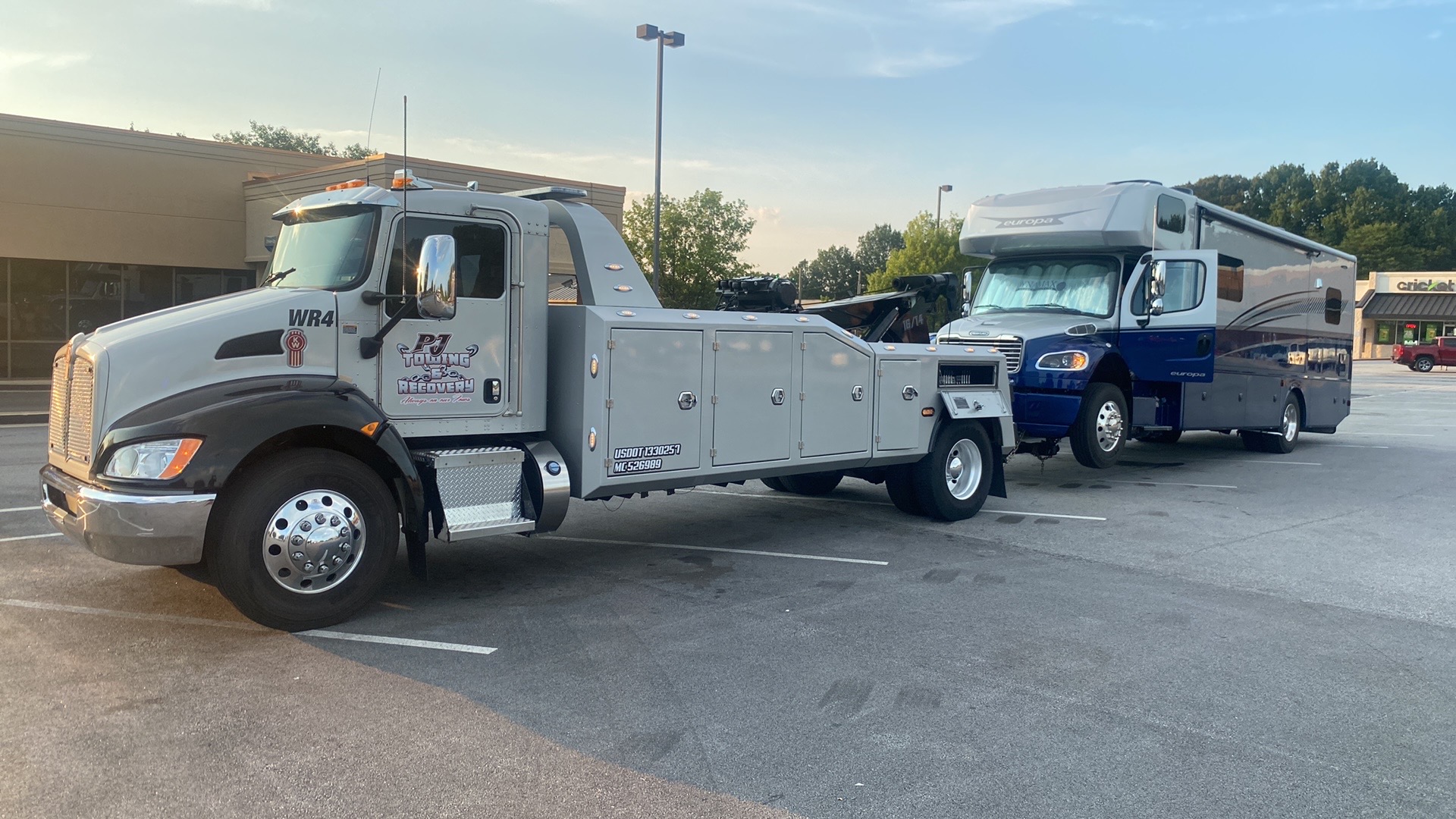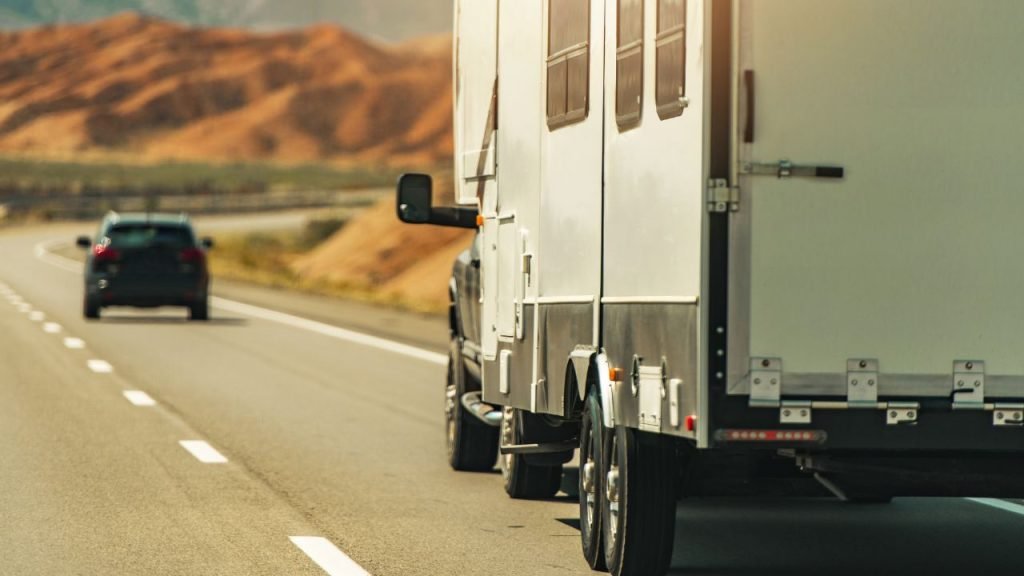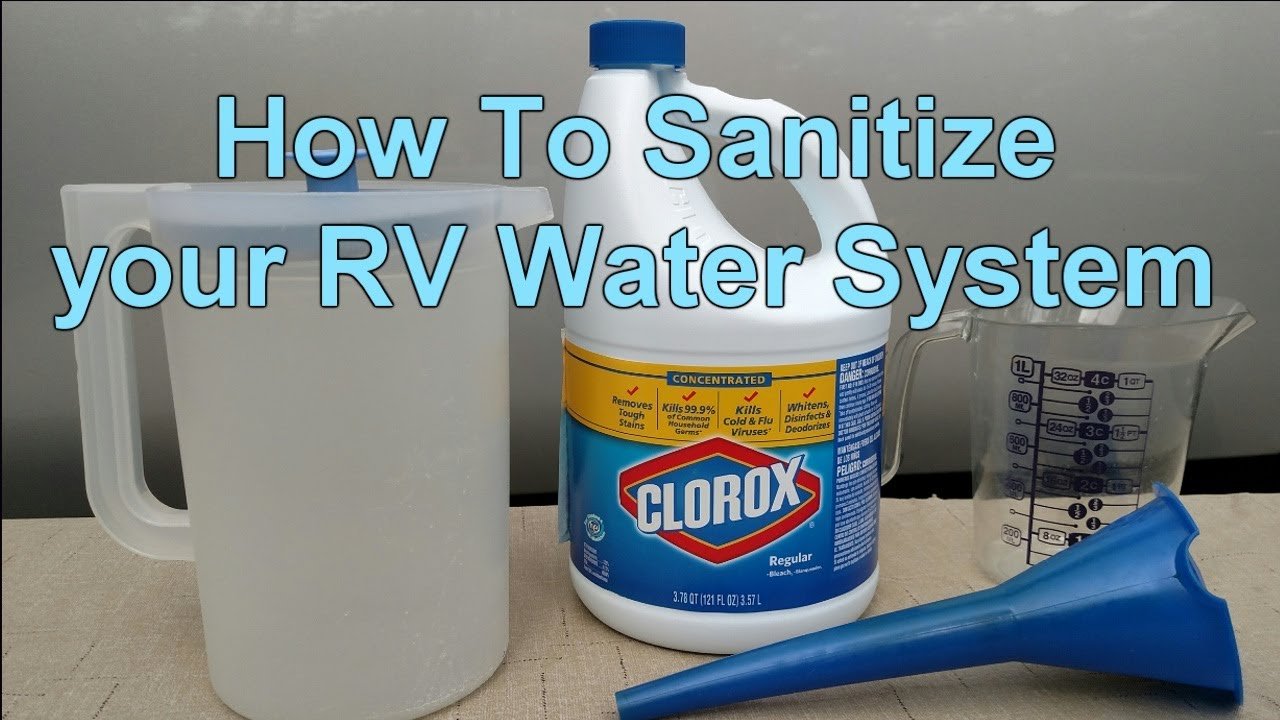The cost to tow an RV varies based on several factors. Distance, size of the RV, and location all play a role.
Towing an RV can be a significant expense for many travelers. Understanding the costs involved helps you plan your budget better. Whether you’re moving across town or embarking on a cross-country journey, knowing what to expect can save you from surprises.
Different towing companies have different pricing structures. Some charge by the mile, while others may have flat rates. Additionally, the type of RV you own can influence the cost. Larger RVs generally cost more to tow. This blog will break down the costs associated with towing an RV, helping you make informed decisions. Let’s dive in and explore the factors that determine the cost to tow an RV.

Credit: pjtow.com
Factors Affecting Towing Costs
Understanding the factors that affect RV towing costs can help you budget better. Several elements come into play. Let’s explore these in detail.
Rv Size And Weight
The size and weight of your RV play a significant role. Larger and heavier RVs cost more to tow. This is due to the need for specialized equipment. Smaller RVs are easier and cheaper to tow.
Distance To Be Towed
The distance your RV needs to be towed also impacts the cost. Longer distances usually mean higher costs. Shorter distances are generally more affordable.
Type Of Towing Service
The type of towing service you choose affects the price. Flatbed towing is often more expensive than other methods. Wheel-lift towing is typically less costly.
Location And Accessibility
Your RV’s location and how accessible it is can influence costs. Remote or hard-to-reach locations may incur extra charges. Easy-to-access areas generally cost less.

Credit: longdistancetowing.com
Average Cost Range
Understanding the average cost range for towing an RV can help you budget better. Costs vary based on several factors including distance, size, and emergency needs. Let’s break down the costs into different categories to give you a clearer picture.
Short Distance Tows
For short distance tows, the cost is generally lower. These are typically within 25 miles. You can expect to pay between $75 and $150. Prices depend on the towing company and the size of your RV.
Long Distance Tows
Long distance tows cover distances over 100 miles. These are more expensive due to the mileage. Costs can range from $4 to $7 per mile. For example, a 200-mile tow could cost between $800 and $1400.
Emergency Towing
Emergency towing services are available 24/7. They are more costly due to their immediate nature. Expect to pay a base fee plus mileage. The base fee can be $100 to $300. Additional mileage charges apply, similar to long distance tows.
| Type of Tow | Cost Range |
|---|---|
| Short Distance | $75 – $150 |
| Long Distance | $4 – $7 per mile |
| Emergency | $100 – $300 base fee + mileage |
Knowing these cost ranges helps you plan and avoid surprises. Always get a quote before committing to a tow service.
Additional Fees And Charges
Understanding the additional fees and charges involved in towing an RV is crucial. These costs can add up quickly, making your overall expense higher than expected. Below, we break down some common extra charges you might encounter.
Hook-up Fees
Many towing companies charge a hook-up fee. This fee covers the time and effort required to attach your RV to the tow truck. The hook-up fee can vary based on the company and the size of your RV. Typical hook-up fees range from $50 to $150. Make sure to ask about this fee upfront.
Mileage Rates
Mileage rates are another important factor. Most towing companies charge per mile. This rate can range from $2 to $4 per mile. For example, if you need to tow your RV for 100 miles, and the rate is $3 per mile, your total mileage cost will be $300. Always clarify the mileage rate before the service begins.
After-hours Service
If you need towing services outside of regular business hours, you may face after-hours charges. These fees can be significantly higher. Companies often charge an additional $50 to $200 for services provided during nights, weekends, or holidays. To avoid surprises, check the company’s after-hours policy in advance.
Cost-saving Tips
Everyone wants to save money, especially while towing an RV. Understanding various cost-saving tips can help. Here are some effective ways to reduce towing expenses.
Membership Programs
Many roadside assistance programs offer discounts on towing services. Consider joining clubs like AAA or Good Sam. Members often get lower rates on towing. These programs can also offer other benefits. Discounts on repairs and maintenance are common. They may even provide travel maps and guides.
Insurance Coverage
Check if your RV insurance covers towing. Some policies include it. This can save you a lot of money. Contact your insurance company to find out. If not covered, consider adding it. The extra cost may be worth it. Better safe than sorry.
Seasonal Discounts
Towing companies may offer discounts during off-peak seasons. Rates can be lower in winter or fall. Plan your trips during these times. You might find better deals. Always ask about seasonal rates. You never know what savings you might find.
Choosing A Towing Service
Choosing the right towing service for your RV is crucial. It ensures your vehicle’s safety and your peace of mind. Many factors can affect the cost of towing an RV. One of the biggest factors is the towing service you choose. Below, we discuss the key considerations when selecting a towing service for your RV.
Reputation And Reviews
Reputation matters. A towing service with a good reputation is more likely to provide reliable service. Look for reviews online. Check out the company’s website, Google reviews, and social media pages. Positive reviews and high ratings can indicate trustworthy service. On the other hand, numerous negative reviews might be a red flag. Always read both good and bad reviews to get a balanced view.
Experience With Rvs
Not all towing services handle RVs. An experienced RV towing service understands the unique requirements of towing such large vehicles. They know how to secure an RV properly and transport it safely. Ask the towing service about their experience with RVs. Experience is key to ensuring your RV is in good hands. You do not want an inexperienced team handling your precious vehicle.
Customer Service
Good customer service can make a big difference. A company with excellent customer service will be responsive and helpful. They will answer your questions and address your concerns. Look for a towing service that offers 24/7 customer support. This ensures you can get help anytime you need it. Also, pay attention to how they communicate with you. A friendly and professional attitude is a good sign.
| Factor | Details |
|---|---|
| Reputation | Check reviews and ratings online. |
| Experience | Ensure they have experience with RVs. |
| Customer Service | Look for 24/7 support and professional communication. |
Choosing the right towing service involves careful consideration. Reputation, experience, and customer service are key factors. These can ensure a smooth and safe towing experience for your RV.

Credit: snoopystowing.com
Preparing Your Rv For Towing
Towing an RV involves costs that vary based on distance, weight, and required services. On average, expect to pay between $100 to $300 for short distances. Longer hauls or special needs can raise the price significantly.
Getting your RV ready for towing is essential. Proper preparation ensures safety and prevents damage. Follow these steps to prepare your RV.Securing Belongings
Secure all items inside the RV. Loose objects can cause damage. Use bungee cords or straps to keep things in place. Check cabinets and drawers. Lock them to avoid spills.Checking Fluid Levels
Check all fluid levels. This includes oil, coolant, and brake fluid. Low levels can lead to engine trouble. Top up where needed. Ensure your RV is in good condition.Disconnecting Utilities
Disconnect all utilities. This includes water, electricity, and gas. Turn off the main power switch. Unplug from external power sources. Make sure all connections are secure. “`Insurance Considerations
Understanding the cost to tow an RV is essential. But, it’s also crucial to consider insurance. Insurance can impact your out-of-pocket expenses. Below, we explore important insurance aspects for RV towing.
Coverage Types
There are different insurance coverage types for RV towing. Here are some common ones:
- Comprehensive Coverage: Covers damages not caused by a collision.
- Collision Coverage: Covers damages from an accident.
- Roadside Assistance: Helps with towing and other emergencies.
Each type of coverage has its benefits. It’s important to understand what your policy covers.
Filing A Claim
Filing a claim for RV towing can be straightforward. Here are steps to follow:
- Contact your insurance company.
- Provide necessary information about the incident.
- Submit any required documents.
- Follow up on your claim status.
Remember, timely filing can affect your claim approval.
Policy Limits
Insurance policies have limits. These limits define the maximum amount covered. It’s important to know your policy limits:
| Coverage Type | Limit Amount |
|---|---|
| Comprehensive Coverage | $10,000 |
| Collision Coverage | $15,000 |
| Roadside Assistance | $500 |
Knowing your policy limits helps avoid unexpected costs. Check your policy details for specific limits.
Diy Vs Professional Towing
Towing an RV can be challenging. Choosing between DIY towing and professional services is crucial. Each option has its own set of benefits and drawbacks. Understanding these can help you make an informed decision.
Pros And Cons Of Diy
DIY towing can save money. You avoid service fees. It also provides flexibility. You can move the RV anytime. Yet, it demands proper equipment. You need a suitable vehicle. Driving skills are essential. Towing an RV can be risky. Damage to the RV or vehicle is possible. Safety is a major concern. You must adhere to towing laws.
When To Hire Professionals
Professional towing offers peace of mind. Experts handle the job. They have proper equipment. They follow safety protocols. Hiring professionals is ideal for long distances. It’s also best for complex routes. If the RV is large or heavy, professionals are recommended. They manage difficult situations. If you lack experience, hire a professional. It prevents potential mishaps.
Cost Comparison
DIY towing can seem cheaper. You avoid labor costs. Yet, consider hidden expenses. You may need to rent equipment. Fuel costs can add up. Vehicle wear and tear is another factor. Professional towing has a clear fee. It covers all services. Rates vary by distance and RV size. Consider convenience and safety. Weigh these against costs.
Frequently Asked Questions
How Much Does It Cost To Tow An Rv?
The cost to tow an RV varies. It typically ranges from $100 to $300. Costs depend on distance, RV size, and towing company.
What Factors Affect Rv Towing Costs?
Several factors affect RV towing costs. These include the distance, RV size, and towing company rates. Additional services can also increase costs.
Is Towing An Rv Covered By Insurance?
Some insurance policies cover RV towing. Check your policy details for specific coverage. Roadside assistance plans may also offer towing services.
How Far Can An Rv Be Towed?
An RV can be towed any distance. Longer distances will increase the towing cost. Confirm with the towing company beforehand.
Conclusion
Towing an RV involves several costs to consider. The distance, size, and weight of the RV impact the price. Different towing services offer varied rates. It’s wise to get multiple quotes. Planning ahead helps in managing expenses. Being aware of potential fees avoids surprises.
Your budget and needs dictate the best choice. Careful research ensures you find the right towing service. Enjoy your RV adventures with peace of mind. Safe travels!




